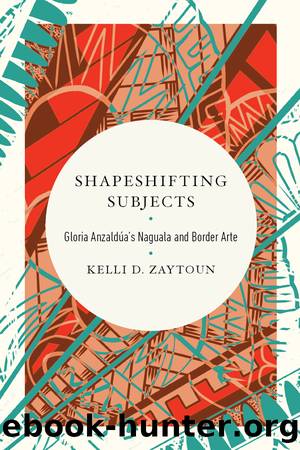Shapeshifting Subjects by Zaytoun Kelli D.;

Author:Zaytoun, Kelli D.; [Kelli D. Zaytoun]
Language: eng
Format: epub
Publisher: University of Illinois Press
Published: 2022-02-21T00:00:00+00:00
Arab American Women Writers and Post-oppositionality
An exploration of Arab American women's writing, with attention to expressions of post-oppositionality, reveals the practical, politically progressive implications of identifying and promoting nagualan consciousness. This section takes up Keating's three âBridgeâ lessons as groundwork for establishing coalition and strengthens those lessons by linking them with Arab American women's writing as examples. Keating honors the authors of This Bridge Called My Back by theorizing three ways in which âradical visions for transformation,â can be built (Transformation Now! 38). Those lessons are (1) âmaking connections through differences,â (2) âpositing radical interrelatedness,â and (3) âlistening with raw opennessâ (38).
Commenting on lesson 1, Keating describes Latina/x and Black writers like Mirtha Quintanales, Andrea Canaan, Audre Lorde, Rosario Morales, and Anzaldúa as those whose work not only attends to difference but also ârefines difference in potentially transformative waysâ (Transformation Now! 38). These writers âexpose (often to themselves as well as to their readers) their own previously hidden fears [of those who are different from themselves] and desiresâfears and desires that have seemed so different, so shameful, that they must be entirely hiddenâ and go on to reveal âa type of intellectual humility by acknowledging the limitations in her knowledgeâ; they then take a risky step of âreaching across this gap to make connection,â finding commonalities but not sameness in the experiences of women of colors from varying backgrounds (39).
Acknowledging and transforming difference into common ground are frequent themes in Arab American women's writings, as well. For example, Abdelrazek demonstrates that Mohja Kahf's poetry â[o]ffers a notion of Arab Muslim women's difference not as static or definitive but, rather, as an opportunity for dialogue and conversationâ (92). Abdelrazek points out that the Muslim American speaker in Kahf's poem âMy Grandmother Washes Her Feet in the Sink of the Bathroom at Searsâ uses the opportunity of a conflict between her grandmother and âwhite Sears matronsâ to âsee beyond the rigid barriers put up by human ignorance,â realizing that âdespite their differences, all people share a common humanityâ (92). The speaker's grandmother is preparing her feet for prayer by washing them in the sink of the store's bathroom, which the âMiddle West[ern]â others find appalling and unclean (Kahf 27). As the only person in the scenario who speaks the languages (Arabic and English) of each of the two conflicting parties, the speaker is called on to translate the angry words that the women are leveling at each other (Abdelrazek 92). The speaker reflects on the situation:
My grandmother knows one cultureâthe right one,
As do these matrons of the Middle West. (Kahf 27)
The speaker recognizes, as she is situated âbetween the door and the mirrorâ and can see âmultiple angles,â that her grandmother and the others are âdecent and goodhearted womenâ (27), so instead of translating the angry words she does the following: âI smile at the Midwestern women as if my grandmother has just said something lovely about them and shrug at my grandmother as if they had just apologized through meâ (28).
Abdelrazek
Download
This site does not store any files on its server. We only index and link to content provided by other sites. Please contact the content providers to delete copyright contents if any and email us, we'll remove relevant links or contents immediately.
The Power of Myth by Joseph Campbell & Bill Moyers(925)
Half Moon Bay by Jonathan Kellerman & Jesse Kellerman(909)
A Social History of the Media by Peter Burke & Peter Burke(879)
Inseparable by Emma Donoghue(844)
The Nets of Modernism: Henry James, Virginia Woolf, James Joyce, and Sigmund Freud by Maud Ellmann(738)
The Spike by Mark Humphries;(719)
A Theory of Narrative Drawing by Simon Grennan(705)
The Complete Correspondence 1928-1940 by Theodor W. Adorno & Walter Benjamin(703)
Ideology by Eagleton Terry;(657)
Bodies from the Library 3 by Tony Medawar(648)
Culture by Terry Eagleton(646)
World Philology by(645)
Farnsworth's Classical English Rhetoric by Ward Farnsworth(641)
A Reader’s Companion to J. D. Salinger’s The Catcher in the Rye by Peter Beidler(614)
Adam Smith by Jonathan Conlin(606)
Game of Thrones and Philosophy by William Irwin(592)
High Albania by M. Edith Durham(589)
Comic Genius: Portraits of Funny People by(581)
Monkey King by Wu Cheng'en(575)
